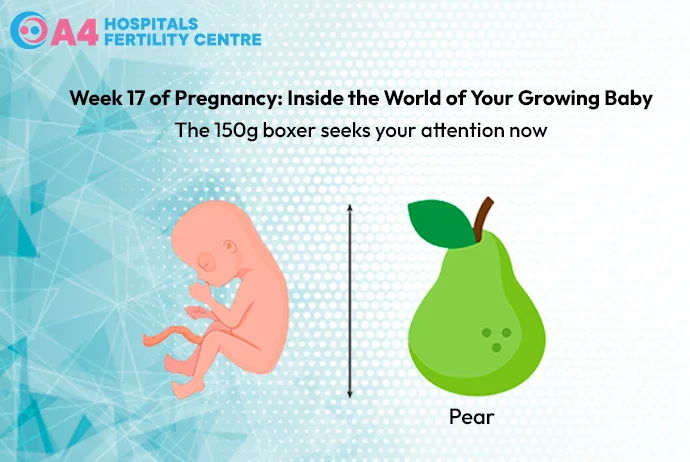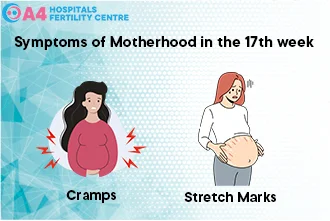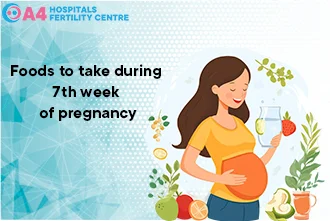
Dr. Aruna Ashok MBBS, MS OG, DNB OG
- Clinical Director

Your baby at 17 weeks is about the size of a turnip, weighing around 150 grams! This little one is becoming more active, flexing those tiny arms and legs, and might even be practicing some boxing moves. You may start to feel these movements, known as quickening, as little flutters in your abdomen. These movements are reassuring signs of your baby's growth and development.
The muscles and bones of your baby are getting stronger, making their movements more noticeable. These movements help your baby's muscles and joints develop for life outside the womb. You might not feel every kick and punch because your baby has plenty of room to move around. But over time, you'll start to see a pattern in their movements.
It's important to pay attention to your baby's movements. Observe them and tell your healthcare provider about any big changes. Less movement could be a sign of a problem. So it is vital to see a doctor if you notice any changes in your baby's activity levels. Every pregnancy is different, so what's normal for one woman may not be normal for another. Trust your instincts and seek help if you're worried about your baby's movements.


In this stage, you might notice typical signs of pregnancy, like a bigger belly, changes in your skin, and feeling hungrier. Your uterus is growing to make room for your baby, which can make your belly get bigger and your skin stretch. You might see stretch marks on your belly, breasts, and thighs as your body gets ready for childbirth.
During pregnancy, hormonal changes increase blood flow to your skin. This can change your complexion. Many women get a "pregnancy glow." This means they look radiant and flushed because of more blood flow. Some women also get spider veins. These are small blood vessels you can see on the face, neck, and other areas.
Another change some women have during pregnancy is more vaginal discharge. This is called leukorrhea. It's normal and helps protect the birth canal from infection. Usually, it's clear or white and doesn't smell strong. But if you notice changes in color, consistency, or smell, talk to your healthcare provider. It could be a sign of infection or another problem.
It's important to remember that every woman's pregnancy is different, and you may not experience all of these changes. However, if you have any concerns about changes in your complexion or vaginal discharge, don't hesitate to reach out to your healthcare provider for guidance and reassurance.
You may also experience round ligament pain as your uterus expands. This sharp, stabbing pain on the sides of your abdomen is caused by the stretching of the ligaments that support your uterus. Round ligament pain is common and usually harmless. But, if you experience severe or persistent pain, it's important to seek medical attention.
A well-balanced diet is crucial for both you and your baby's health. Focus on nutrient-rich foods such as fruits, vegetables, whole grains, and lean proteins. Incorporate foods rich in iron to prevent anemia and foods high in calcium for strong bones and teeth. Stay hydrated and aim for small, frequent meals to help with digestion and avoid heartburn.
Include plenty of fruits and vegetables in your diet to get essential vitamins and minerals. Foods like spinach, broccoli, oranges, and strawberries are rich in folic acid, which is important for your baby's development. Lean proteins such as chicken, fish, and legumes are also essential for your baby's growth.
It is best to avoid eating raw or undercooked meats, fish, and eggs. This will keep you and your baby safe from harmful bacteria. These foods can carry dangerous germs like salmonella and listeria. Such germs can make you very sick. Also, steer clear of unpasteurized dairy products. Such products might have harmful bacteria that can lead to infections.
When it comes to caffeine, it's wise to be cautious during pregnancy. Having a moderate amount is generally okay. But too much can increase the risk of miscarriage and having a baby with low birth weight. Try to limit your caffeine intake. You may have 200 milligrams per day, which is like having one 12-ounce cup of coffee.
Alcohol and tobacco products should be avoided altogether during pregnancy. Because, they can have harmful effects on your baby's development. Alcohol consumption during pregnancy has been linked to fetal alcohol spectrum disorders. It can cause a range of physical, behavioral, and learning disabilities in children. Similarly, smoking during pregnancy has been linked to many high risks. Risk of preterm birth, low birth weight, and sudden infant death syndrome (SIDS) are a few risks to name.
Say, you have any dietary restrictions or concerns. It is important to consult your healthcare provider for personalized advice. They can help you make informed decisions about your diet and lifestyle to ensure a healthy pregnancy for you and your baby.
Stay connected with your healthcare provider during the progress of your pregnancy journey. They can offer guidance on prenatal vitamins, exercise, and any specific concerns you may have. Consider discussing your birth plan and any questions about labor and delivery. Joining a birthing class, like those offered at A4 Fertility Centre, can also provide valuable information and support.
Your healthcare provider can also provide counseling on genetic testing. Many screening options are available to you. These tests can assist in identifying any potential genetic disorders. They also help identify birth defects in your baby. Your healthcare provider or doctor can discuss the benefits and risks of these tests. They can help you make an informed decision about whether to proceed.
At this stage, your healthcare provider may recommend a mid-pregnancy ultrasound. It is also known as an anatomy scan. This ultrasound can help assess your baby's growth and development. It checks the placenta and amniotic fluid levels, and detect any potential abnormalities. Your healthcare provider may also recommend tests based on your medical history and risk factors.
Gestational diabetes is a type of diabetes that can develop during pregnancy. It affects about 2-10% of pregnant women. It occurs when your body can't produce required insulin. This is to meet the extra needs of pregnancy, leading to high blood sugar levels.
To screen for gestational diabetes, your healthcare provider may offer you a glucose challenge test (GCT). This test involves drinking a sugary solution. After that, having your blood sugar levels measured after an hour. If your blood sugar levels record higher than normal, you may need to undergo further testing to diagnose gestational diabetes.
If you are diagnosed with gestational diabetes, it's important to manage your condition to protect both your health and the health of your baby. This includes a regularly monitor of your blood sugar levels, following a special diet, and, in some cases, taking insulin.
Untreated gestational diabetes can cause complications. These include preeclampsia, preterm birth, and macrosomia (a condition where your baby grows larger than average). These complications can make delivery riskier. But with proper management, most women with gestational diabetes can have a healthy pregnancy. Additionally, they can deliver a healthy baby.
It's important to discuss any concerns or questions you have about tests and procedures with your healthcare provider. They can provide you with the information you need to make informed decisions about your pregnancy care.
A4 Fertility Centre's Birthing classes are designed to empower pregnant women with the knowledge and skills they need to have a healthy pregnancy journey. These classes offer a comprehensive approach to prenatal education, covering everything from nutrition and exercise to labor and delivery.
One of the key focuses of A4 Fertility Centre's Birthing classes is on nutrition. Pregnant women are taught the importance of eating a well-balanced diet rich in essential nutrients for both themselves and their growing baby. They learn about foods to avoid during pregnancy and how to manage common pregnancy-related symptoms like nausea and heartburn through diet.
Exercise is another crucial component of the Birthing classes. Women are encouraged to engage in safe and effective prenatal exercises. This will help strengthen their bodies and prepare them for labor. These exercises improve physical fitness. It also helps lessen common pregnancy discomforts such as back pain and swelling.
The classes also cover important topics related to labor and delivery. Women learn about the stages of labor, breathing techniques, and pain management strategies. They are also educated about the various medical interventions, that may be used during labor and how to make informed decisions about their birth preferences.
A4 Fertility Centre's Birthing classes emphasize the importance of emotional well-being during pregnancy. Women are taught relaxation techniques and coping mechanisms to manage stress and anxiety. They are also encouraged to share their feelings and experiences with other expectant mothers, creating a supportive community of women going through similar journeys.
In addition to the practical aspects of pregnancy and childbirth, the classes also address the emotional and psychological aspects of becoming a parent. Women learn about bonding with their babies adjusting to the changes parenthood brings, and preparing for the postpartum period.
A4 Fertility Centre's Birthing classes offer special care to each woman. The classes are taught by experienced healthcare providers who listen to each woman's needs. This personalized care helps women feel strong and cared for during their pregnancy.
A4 Fertility Centre's Birthing classes help pregnant women learn and grow. These classes focus on food, exercise, emotions, and childbirth. They give women confidence and prepare them for childbirth and being a mom.